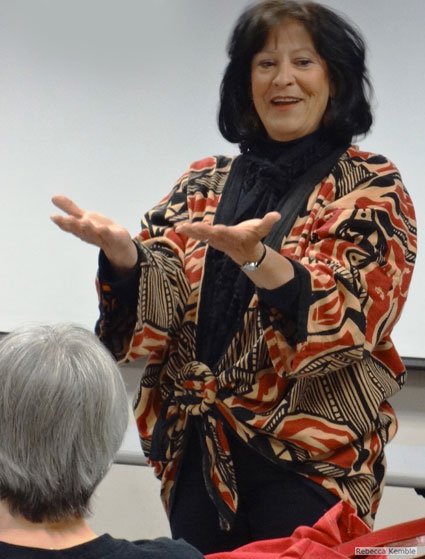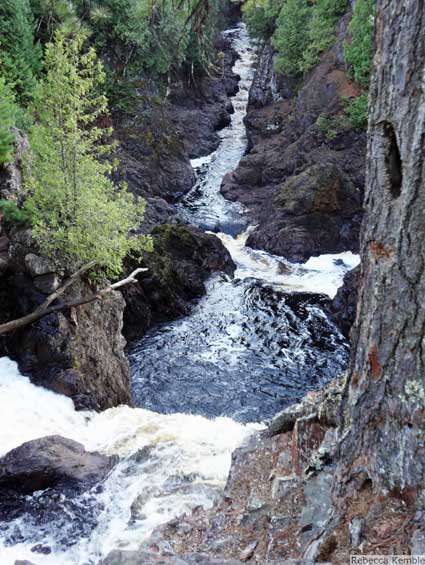The final session of the 2011– 2012 Wisconsin State Legislature came to a close last month before a controversial mining bill could be passed by the Senate. Media stories focused on the pivotal role of Senator Dale Schultz (R-Richland Center) in thwarting the bill that proposed sweeping exemptions from environmental regulations for iron mining companies in the state. Few, if any, described the deep roots of popular resistance that informed and gave rise to his no vote.
On Monday night, Patty Loew, the University of Wisconsin professor of communications, documentary film producer, and Bad River Ojibwe member, talked to a group of about fifty people about these underlying forces. She was addressing a meeting of the local chapter of 350.org, Bill McKibben’s activist network concerned about climate change and peak oil.
Loew talked about manoomin, which she translated as “wild rice, my relative,” stressing its centrality to the culture, spirituality, and livelihood of the Anishinaabe people. Their origin stories and stories about their migration over the past thousand years back to Lake Superior from the East Coast feature “the place where food grows on the water.” She then went on to discuss how every battle over land and every treaty that they negotiated was about retaining their rights to care for the water and harvest the wild rice.
The proposed 22-mile long open pit mine in the Penokee Hills lies at the headwaters of the Bad River, which flows into the Bad River and Kakogan Sloughs, the most extensive wild rice beds in the country. These beds are the source of seed for all of the other wild rice beds in the region. "For the Bad River, that space along the shores of Lake Superior is our sacred place,” said Loew. “And for the past 1,000 years, everything we've done has been about protecting the wild rice."
She talked about the clash of values between “mainstream society” and Anishinaabe culture: “The politicians, mining executives, corporate interests that come to the south shore of Lake Superior and see dollar signs and think about the metals that can be extracted--they don’t see church spires or stained glass and so they don’t see this as a sacred space. They don’t see that Bad River has made deliberate decisions to not enrich ourselves monetarily so that we can protect the land. And we do this not only for us, but for everyone."
The value of wild rice was also a critical factor in the struggle against the mine that Exxon wanted to dig near Crandon, WI, in the 1970s and again in the 1990s. (A battle over wild rice beds that occurred between the Sioux and the Anishinaabe back in 1806 resulted in many deaths, and the burial grounds for the people who died fighting for the wild rice is located in a cave at Spirit Hill, right near the proposed mine site.)
As Loew interviewed a tribal elder about the struggle against that mine years later, she came to understand that the Sakoagan people who lived there viewed the fight in much more than simple environmental or political terms. Their very existence as Anishinaabe people depends upon maintaining those burial grounds and the nearby rice beds intact. "Everything worth knowing and remembering and passing down radiates from that place," said Loew.
She then talked about how the “Walleye Wars” over native spear-fishing rights represented a difficult period for Wisconsin tribes in the long struggle to defend their rights in ceded territory. A 1983 U.S. Supreme Court decision upheld those rights. For eight years Wisconsin tribes faced racial violence and threats of violence by small groups of non-native hunters and anglers who resented the federal recognition of their special rights and their ability to take walleye during spawning season.
Loew pointed out, however, that when Exxon came back to town in 1994, some of those same people who wanted to keep the lakes and forests free from pollution so they could continue to enjoy fishing and hunting “began to understand that the only thing standing in the way of complete ruin of the environment that they valued was native treaty rights." Thus was born an alliance of native communities, outdoor sports people and labor unions that ultimately ran Exxon out of town.
As people once resentful of treaty rights understood that those very rights could be asserted by the tribes to block the mine, they began to accept the idea. “That infatuation then blossomed into a romance,” said Loew of the relationships between hunting, fishing and conservation groups and environmental and tribal anti-mining activists over this past year during the fight against the proposed mining of the Penokee Hills.
Throughout the past year, this broad, diverse group of opponents of the bill was able to mobilize quickly thanks to the relationships that had been built up over the years. They had been prepared for the worst possible outcome: Quick passage followed by a hasty permitting process and the first phase of the mine initiated within a year. This, in fact, was the scenario described by the bill’s proponents at a press conference in October.
As the bill was rammed through passage by the Assembly within five weeks of its introduction, opponents stepped up public education campaigns, prayers and ceremonies to protect the air, land and water, and planning for the next phase of the struggle against what appeared to be a done deal that would pave the way for the mountain top removal project.
Senators Schultz and Bob Jauch (D-Poplar) took the lead in crafting a compromise bill through the senate Select Committee on Mining Jobs. When details of their bill were unveiled, Senate Majority Leader Scott Fitzgerald (R-Juneau) promptly dissolved the committee and referred the Assembly version of the bill to the Joint Finance Committee.
This yanking of the rug out from under them motivated the senators to take a weekend tour of the proposed mine site, meet with tribal authorities and hold listening sessions with the people from the area who would be most affected by the mine. This was the first opportunity for people to speak freely to legislative representatives about their concerns in an open, public session without a three-minute time limit.
The months, years and decades of organizing and consciousness-raising in the state by activists and tribal members about treaty rights and the effects of mining on underground and above ground water paid off that weekend. Even residents who were pro-mining spoke out against the bill, saying that protections for water and air quality were more important than jobs at any cost. Evidently, the message got through.
Dale Schultz alone knows the factors that led to his vote to kill the mining bill, but his statement on the Senate floor highlighted the importance of science in the review process and the Public Trust Doctrine that contains constitutional protections for Wisconsin’s water resources: “State courts have continuously upheld that the state’s waters belong to the people regardless of whether they are intermittent or miniscule.”
Patty Loew closed her talk by answering questions from the 350.org audience. One person asked her about how the tribes were tackling the issue of climate change. Loew referred the audience to the Great Lakes Indian Fish and Wildlife Commission website, and then talked about her efforts to train a generation of Anishinaabe kids in culturally relevant science to build their internal capacity to respond to shifting ecological conditions.
In closing, she related a heartbreaking question put to her by a 9-year-old girl recently: "The scientists say the rice beds are migrating north because of climate change, so how are we going to be Ojibwe if the rice is gone and the clan animals don’t live in our community anymore?"
Rebecca Kemble is an Anthropologist who studied decolonization in Kenya. She serves on the Board of the US Federation of Worker Cooperatives and is a founding member of the Wisconsin Citizens Media Cooperative.

